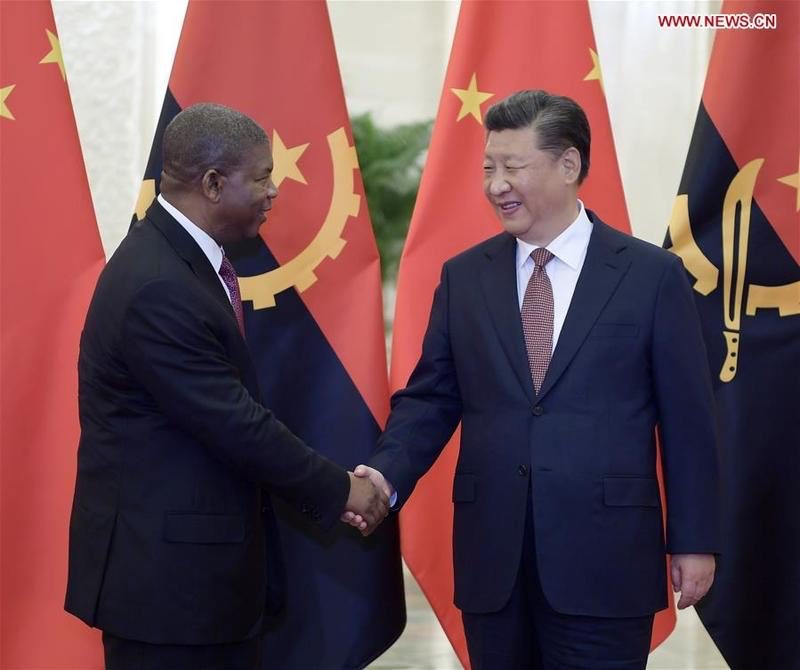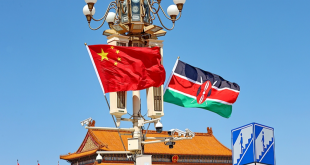Published: March 19,2024

On Friday in Beijing, Chinese President Xi Jinping and Angolan President Joao Lourenco announced the elevation of bilateral ties to a comprehensive strategic cooperative partnership.
Angola, a Portuguese-speaking country in Southwest Africa emerging from a 27-year civil war that ended in 2002, has enjoyed a flourishing partnership with China over the past two decades. This partnership is characterized by cooperation across various fields, and Angola has achieved significant progress in rebuilding the country, industrial modernization and talent development.
As Xi said during talks with Lourenco, China-Angola cooperation is South-South cooperation and cooperation between developing countries. It is defined as mutual help between good friends, reciprocity and win-win collaboration.
FACILITATING NATIONAL RECONSTRUCTION
Located 18 km south of Luanda, Angola’s capital, the “new city,” Kilamba stands prominently on the horizon. More than a decade after its completion, this monumental public welfare project, executed by Chinese firms, comprises 700 buildings and 20,000 housing units, providing contemporary living conditions for its 120,000 inhabitants.
“I’ve been living here since January 2013, and back then, it felt like a fresh, pioneering city, with everything shining,” 73-year-old resident Gaspar Pedro told Xinhua.
Pedro’s home is situated in a 13-story residential building. Inside his cozy, orange-hued living room, a collection of family photos, including his daughter’s wedding and the birth of his grandchildren, adorn one side of the bookshelf. Pedro enjoys a tranquil retirement life here with his wife, frequently visited by their children and grandchildren.
Mario Cassinda, who has managed a restaurant “PuroTempero” in Kilamba for six years, believes the city has addressed more than just housing issues.
“It was constructed on a barren land. Since the city’s establishment, it has created more jobs and attracted many people from the outskirts. I can say it’s a beneficial project,” said Cassinda.
The City of Kilamba, formerly known as the KilambaKiaxi Housing Project, was initiated by Chinese company CITIC Construction. It features well-equipped facilities, including schools, water treatment plants and substations, ensuring residents enjoy a comfortable lifestyle.
Chinese engineer Qi Juntuan, who participated in the city’s construction, recalled the challenges they encountered, particularly the uncommon issue of poor soil adhesion, a problem rarely encountered by Chinese engineers elsewhere.
“The team, working tirelessly day and night, eventually overcame these obstacles with techniques like layered backfilling,” he said. “The thought of applying our knowledge to bring tangible improvements to the local area fills us with great motivation.”
In 2010, Xi visited Angola, when Angola and China announced the establishment of a strategic partnership. Xi personally inspected the project, spending half a day there, inspiring builders from China and Angola.
Rising from once barren land, the new city is a testament to the accelerated cooperation between the two nations.
China and Angola celebrated the 40th anniversary of their diplomatic relations in 2023, and the partnership continues to thrive. Deepened political trust and practical cooperation have benefited the people of both nations.
China has been Angola’s largest trading partner, largest export market and an essential source of investment for many years, while Angola is China’s second-largest trading partner in Africa.
Drummond Mafuta, president of the Board of Directors of Edicoes Novembro, one of Angola’s largest media groups, commented that when the Angolan civil war ended and the country needed reconstruction, China was the first to extend a helping hand.
Mafuta said friendship with China “is and will always be marked in the history of Angola’s reconstruction.”
FOSTERING INDUSTRIAL DEVELOPMENT
After the talks on Friday, Xi and Lourenco jointly witnessed the signing of several bilateral cooperation documents regarding the Belt and Road cooperation plan, the economy and trade, agriculture, green development and other fields.
Tiago Quissua Armando, a scholar at Angola’s Venancio de Moura Diplomacy Institute, sees the outcomes of the leaders’ talks as addressing vital issues for Angola, such as economic diversification, industrial investment and agricultural modernization.
“President Lourenco’s visit also includes a trip to Shandong, a Chinese province with significant experience in the agricultural sector. Angola can benefit from this experience to enhance its local industry,” he said.
Last year, Shandong Province signed a friendly cooperation agreement with Bengo Province of Angola, committing to strengthening cooperation in agriculture, economy, trade and vocational education.
One of the flagship Shandong enterprises in Angola is the Sino-Ord Industrial Park. Since its establishment in 2019, the park has launched six industrial projects, with around 200 Chinese employees and approximately 1,700 local workers.
In June 2021, the Angolan president visited the industrial park and praised its role in boosting local employment, increasing tax revenue, and propelling Angola’s industrialization and economic diversification efforts.
“Working with colleagues from China and other countries has broadened my horizons and made me realize that only through strengthening international cooperation can our country’s development be more hopeful,” said Joao Paulo, a senior external relations manager who has worked at the industrial park for many years.
In Luanda, the Fatima Furniture Factory of the Qingdao Yewhing Group has set an example in the local industry by providing employment opportunities for hundreds of families.
“Having the factory or local production not only provides the product but also creates jobs, allowing more Angolans to have a source of sustainability for their families. Now, everyone here dreams of becoming an excellent technician,” said Wilson Manuel, a 30-year-old human resources manager at the furniture factory.
Today, products such as cabinets and wardrobes from the factory account for 40 percent of the domestic market in Angola, while the factory’s sofa brand occupies a quarter of the market share.
Angola’s Minister of Industry and Commerce RuiMiguens said China’s industrial development has raised living standards. He noted that Angola hopes to learn from China’s experience in industrialization and looks forward to more Chinese companies investing in Angola.
CULTIVATING FUTURE TALENT
Luis Erivaldo, a young Angolan working at Huawei, developed a strong interest in communication technology during his school years. After four rounds of interviews, he joined Huawei Angola and, over six years, grew from a freshman to a technical director.
In 2022, the Angolan government signed a memorandum of understanding with Huawei for a “digital talent” training program, which plans to train over 10,000 Angolan youths in the next five years.
There is a broad scope for cooperation in vocational education between China and Africa.
In August 2023, President Xi co-chaired with South African President Cyril Ramaphosa the China-Africa Leaders’ Dialogue in Johannesburg, proposing initiatives to strengthen practical cooperation between China and Africa and support African integration and modernization, including the Plan for China-Africa Cooperation on Talent Development.
The inauguration ceremony of the Chinese-donated Integrated Center for Technological Training took place in Huambo City, Angola, on Jan. 12. The 20,000-square-meter center has 30 laboratories and six workshops covering robotics, mechanical processing, computer science and automotive repair. In its first phase, it plans to train 2,400 people annually.
President Lourenco personally inaugurated the training center. During his visit, he inquired in detail about the project’s construction and teaching plans. Just before leaving, he stepped out of his car to shake hands and again express gratitude to the Chinese personnel.
“This is a modern training center with complete facilities, and all the teachers have been trained in China. We are very grateful for China’s help and look forward to continuing cooperation with China in the future,” said Geraldo Pambasange, the training center’s principal.
Secretary of State for Labor and Social Security of Angola Pedro Filipe said that in recent years, vocational training and talent cultivation have become critical areas of cooperation between Angola and China.
China and Angola have a strong foundation for mutually beneficial cooperation. As relations progress, the two nations will witness exciting new chapters in their friendship.
Xinhua
 Africa -China Review Africa -China Cooperation and Transformation
Africa -China Review Africa -China Cooperation and Transformation
